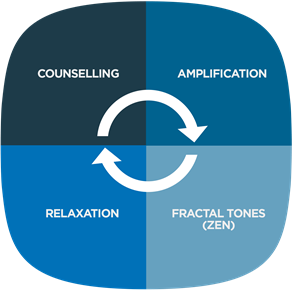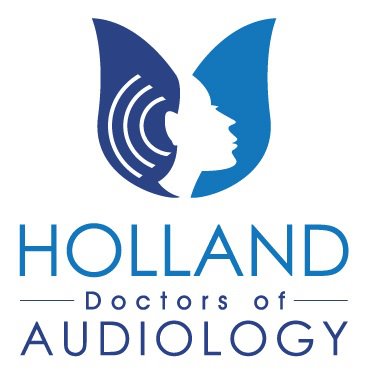Tinnitus Treatment in Michigan
Approximately one in five adults experiences tinnitus, or ringing in the ears. At Holland Doctors of Audiology, we provide many different solutions for treating and improving tinnitus for patients.
What is Tinnitus?
Tinnitus is the perception of sound in the absence of any corresponding external sound. Tinnitus is, usually, a high-pitched ringing sound but in many cases can be like hissing, buzzing, clicking, chirping, whistling, and other sounds.
How to do you say it?
It is pronounced ‘tin-e-tus’ (/ˈtɪnɪtəs/) or ‘tin-eye-tus’ (/tɪˈnaɪtəs/.) The word is derived from the latin ‘tinnio’ meaning “to ring.” The suffix “-itis” suggests inflammation/infection (e.g., otitis, appendicitis, tendonitis, etc.) which does not describe tinnitus. While both pronunciations are correct, we prefer the less ‘medical’ and more descriptive ‘tin-e-tus.’
Is it rare?
No. Nearly 15% of everyone — almost 50 million Americans — experience some form of tinnitus. Most experience it briefly and it’s not bothersome. Roughly 20 million people struggle with more bothersome chronic tinnitus, while 2 million have extreme and debilitating cases. Tinnitus is the number one disability among Veterans with over 150,000 new cases every year and a total of over 1.5 million VA tinnitus disability claims.
What causes/worsens tinnitus?
Should You Worry?
In some cases, tinnitus should not be ignored and warrants immediate medical attention.
Seek an evaluation for:
Is there a cure?
With the exception of tinnitus from specific medical problems, there is no known “cure” to permanently stop tinnitus. However, there are many ways to reduce tinnitus, offering substantial relief.
What works?
Believing in a therapy is a very strong component of success rates and a strong placebo effect has been documented for many tinnitus therapies. When rigorously tested, no significant difference is found between the treated and the controlled groups for: acupuncture, nutritional supplements, vitamins, homeopathic therapies, hypnotherapy. While we can’t dismiss the benefits of these treatments, we do not recommend them for tinnitus relief. Our Doctors can properly diagnose tinnitus and offer clinically proven solutions, customized for every patient.
Experiencing Tinnitus?
Join us at the next ATA Support Group Meeting!
Our tinnitus support group encourages the sharing of experiences in a non-judgmental setting to support those who suffer from the effects of tinnitus. We meet every two months and discuss advancements in therapies, clinically proven methods of cognitive behavioral and sound therapy as well as our experiences with new tinnitus treatment products. Visit the American Tinnitus Association to learn more.
Tinnitus Treatment Options in Holland, MI
Masking
Using both narrow and broadband tones, we can often play external sounds and noise that make the tinnitus less noticeable for the patient.
Sound Therapy
Sound therapies aim to lessen the perception of tinnitus through one of four actions; masking, distraction, habitation or neuromodulation.
MBTSR
Mindfulness Based Tinnitus Stress Reduction uses relaxation and mediation to help uncover one’s own resources to help deal with the tinnitus.
Tinnitus Retraining Therapy
TRT uses the neurophysiological model to reclassify the ringing sounds as neutral sounds. This is typically used in combination with a noise generator to provide background noise.
Cognitive Behavioral Therapy
Typically used in combination with sound therapies, CBT can ease the anxiety and stress associated with tinnitus. It does this through a process of habituation, which helps patients “ignore” the sounds.
Lenire Bimodal Neuromodulation
Lenire is an evidence-based treatment device proven to soothe tinnitus. Sounds from headphones and gentle pulses to the tongue work together to retrain your brain. You pay less attention to tinnitus reducing its impact on your life.
Otoharmonics Levo
Neuromod Lenire
Notch Therapy
Widex Zen Therapy
Widex provides tinnitus relief through their Zen program, available in Widex hearing aids or as a standalone product.
Counselling
Assist and educate the limbic system to change its negative interpretation of the tinnitus through cognitive training
Amplification
Amplification stimulates the ears, hearing system and brain to prevent overcompensation
Fractal Tones (ZEN)
Unique music program designed to encourage relaxation and make tinnitus less noticeable to the patient
Relaxation
Using behavioral exercises and sleep management strategies, relaxation can become an important part of therapy


